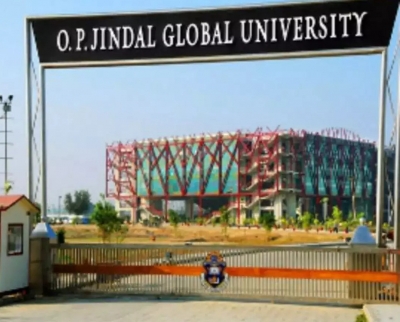
Sonipat, Feb 22 (IANS) The three-day World Universities Summit organised by the International Institute for Higher Education Research and Capacity Building at O.P. Jindal Global University concluded on Wednesday with an on-site Higher Education Leaders Conclave.
Over 100+ University leaders, including Vice-Chancellors, Deans and Heads of Departments from various Universities across Delhi NCR, Haryana and UP participated in the Conclave.
Prof. Philip Altbach, Professor and Founding Director of the Center for International Higher Education, Boston College, US, delivered the keynote address.
He spoke about the crisis of internationalisation and the six Cs: The new Cold War with the Russian invasion of Ukraine, the challenges to mobility posed by Covid, Climate change, the rise of China as regional higher education hub and new modes of Communications and Collaborations, particularly with IT and AI which will affect higher education internationalisation going forward.
He emphasised the fact that India needs to think through how Indian higher education institutions would function within this changing geopolitical and socioeconomic context.
He highlighted the importance of “internationalisation at home” by internationalising the curriculum to increase access to internationalisation for all students and to minimise the impact of physical international mobility on climate change.
Altbach stated that: “To me research collaboration is the key and here is where India offers lot of potential. There are about 20 western universities that has research offices and collaborations in the country. I think that is to be encouraged and very useful for Indian universities.”
He further advised, “Not to think about branch campuses but research collaborations with countries with whom India has soft-power interest like Africa, the Middle East and so on.”
During the conclave, the Founding Vice-Chancellor of O.P. Jindal Global University, Prof. C. Raj Kumar welcomed the audience by providing an overview of the proceedings of the first two days of the 4th World Universities Summit in virtual mode with twenty-five thematic sessions, 225+ Education Leaders from 20 Countries and 6 Continents.
He narrated the humble journey of O.P. Jindal Global University fifteen years ago to the organisation of the summit while reflecting on his own professional journey over the past fifteen years.
President and Distinguished Professor of Innovation and Entrepreneurship at MICA Institute, Ahmedabad, Prof. Shailendra R. Mehta delivered his inaugural address by talking about his decade-long research on the origin and development of the university in India between 600 BC and 1200 AD and its transmission to Central Asia, the Middle East, and Europe (via Jerusalem) and how it influenced the founding of European Universities including Oxford and Paris.
Mehta will be joining O.P. Jindal Global University as a Distinguished University Professor later this year to develop his research findings into a book.
The former Vice-Chancellor of the National Institute of Educational Planning and Administration (NIEPA), New Delhi, Prof. N.V. Varghese also delivered a special address at the Conclave.
In his speech, Varghese highlighted the challenges of “diversified objectives of higher education with massification of higher education” and how “labelling and credentialing” are becoming important with the growth of the private sector in higher education.
He further stated: “Market-friendly reforms are very important, but markets often are not people-friendly. So, the challenge for the future is how do we make markets people-friendly in the higher education field.”
The conclave concluded with a roundtable discussion.
Several Vice-Chancellors, faculty members and students present as audience participated in this discussion with Prof. Philip Altbach to reflect on the broader theme of the 4th World Universities Summit — “Universities of the Future: A Global Partnership for Social Justice and Sustainable Development.”
–IANS
biz/san/prw
Disclaimer
The information contained in this website is for general information purposes only. The information is provided by TodayIndia.news and while we endeavour to keep the information up to date and correct, we make no representations or warranties of any kind, express or implied, about the completeness, accuracy, reliability, suitability or availability with respect to the website or the information, products, services, or related graphics contained on the website for any purpose. Any reliance you place on such information is therefore strictly at your own risk.
In no event will we be liable for any loss or damage including without limitation, indirect or consequential loss or damage, or any loss or damage whatsoever arising from loss of data or profits arising out of, or in connection with, the use of this website.
Through this website you are able to link to other websites which are not under the control of TodayIndia.news We have no control over the nature, content and availability of those sites. The inclusion of any links does not necessarily imply a recommendation or endorse the views expressed within them.
Every effort is made to keep the website up and running smoothly. However, TodayIndia.news takes no responsibility for, and will not be liable for, the website being temporarily unavailable due to technical issues beyond our control.
For any legal details or query please visit original source link given with news or click on Go to Source.
Our translation service aims to offer the most accurate translation possible and we rarely experience any issues with news post. However, as the translation is carried out by third part tool there is a possibility for error to cause the occasional inaccuracy. We therefore require you to accept this disclaimer before confirming any translation news with us.
If you are not willing to accept this disclaimer then we recommend reading news post in its original language.













